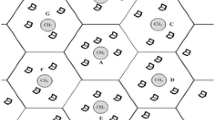Abstract
Mobile ad-hoc networks support interactions and collaborations among autonomous devices by enabling users to share resources and provide services to each other, whether collaborations are for business or leisure purposes. It is therefore important to ensure that interactions are subject to authentication and access control in order to restrict access to only those resources and services that the user intends to share. Existing access control models that are based on membership certificates incur redundant verifications and therefore require significant computation. They are inefficient because devices have to repeatedly verify the requestor’s certificates and check the authorisation policies for each service access request received. In this paper, we present an efficient access control model that combines a membership list with the role-based access control (RBAC) model. Each ad-hoc network has a coordinator that is responsible for maintaining the membership and broadcasting a signed membership list to all participants at regular intervals. The model authorises a service request if the requestor is listed in the membership list and its assigned role is authorised to perform the requested actions. Through experiments, we have observed the efficiency gains obtained through use of this model.
Preview
Unable to display preview. Download preview PDF.
Similar content being viewed by others
References
Bartel, M., Boyer, J., Fox, B., LaMacchia, B., Simon, E.: XML-Signature Syntax and Processing (2002)
Bray, J., Sturman, C.: Bluetooth Connect Without Cables. Prentice Hall PTR, Englewood Cliffs (2000)
Ferraiolo, D., Kuhn, R.: Role-Based Access Controls. In: Proceedings of the 15th National Computer Security Conference, pp. 554–563. NIST (1992)
Gong, L.: Inside Java 2 Platform Security Architecture, API Design and Implementation. Addison-Wesley, Reading (1999)
Hebert, J.: The Perf4J API (2002)
Herzberg, A., Jarecki, S., Krawczyk, H., Yung, M.: Proactive Secret Sharing Or: How to Cope with Perpetual Leakage. In: Proceedings of the 15th Annual International Cryptology Conference on Advances in Cryptology, pp. 339–352. Springer, Heidelberg (1995)
Keoh, S.L., Lupu, E., Sloman, M.: PEACE: A Policy-based Establishment of Ad-hoc Communities. In: Proceedings of the 20th Annual Computer Security Applications Conference (ACSAC), Tucson, Arizona, USA, December 2004. IEEE Computer Society, Los Alamitos (2004)
Mäki, S., Aura, T., Hietalahti, M.: Robust Membership Management for Ad-hoc Groups. In: Proceedings of the 5th Nordic Workshop on Secure IT Systems (NORSEC 2000), Reykjavik, Iceland (2000)
Perrig, A., Canetti, R., Tygar, J.D., Song, D.: The Tesla Broadcast Authentication Protocol. In: RSA Cryptobytes (2002)
Perrig, A., Szewczyk, R., Wen, V., Culler, D.E., Tygar, J.D.: SPINS: Security Protocols for Sensor Networks. Mobile Computing and Networking, 189–199 (2001)
Rivest, R.L., Lampson, B.: SDSI – A Simple Distributed Security Infrastructure. Presented at CRYPTO 1996 Rumpsession (1996)
Sandhu, R.S., Coyne, E.J.: Role-Based Access Control Models. IEEE Computer 29(8), 38–47 (1996)
Saxena, N., Tsudik, G., Yi, J.H.: Admission Control in Peer-to-Peer: Design and Performance Evaluation. In: Proceedings of the First ACM Workshop on Security of Ad-hoc and Sensor Networks (SASN), Fairfax, Virginia, USA (October 2003)
Stajano, F.: The Resurrecting Duckling – What Next(Transcript of Discussion). In: Christianson, B., Crispo, B., Malcolm, J.A., Roe, M. (eds.) Security Protocols 2000. LNCS, vol. 2133, p. 215. Springer, Heidelberg (2001)
Stajano, F., Anderson, R.J.: The Resurrecting Duckling: Security Issues for Ad-hoc Wireless Networks. In: Proceedings of the 7th International Workshop on Security Protocols. LNCS. Springer, Heidelberg (1999)
Zhou, L., Haas, Z.J.: Securing Ad-Hoc Networks. IEEE Network Magazine 13(6) ( November/December 1999)
Author information
Authors and Affiliations
Editor information
Editors and Affiliations
Rights and permissions
Copyright information
© 2005 Springer-Verlag Berlin Heidelberg
About this paper
Cite this paper
Keoh, S.L., Lupu, E. (2005). An Efficient Access Control Model for Mobile Ad-Hoc Communities. In: Hutter, D., Ullmann, M. (eds) Security in Pervasive Computing. SPC 2005. Lecture Notes in Computer Science, vol 3450. Springer, Berlin, Heidelberg. https://doi.org/10.1007/978-3-540-32004-3_21
Download citation
DOI: https://doi.org/10.1007/978-3-540-32004-3_21
Publisher Name: Springer, Berlin, Heidelberg
Print ISBN: 978-3-540-25521-5
Online ISBN: 978-3-540-32004-3
eBook Packages: Computer ScienceComputer Science (R0)




